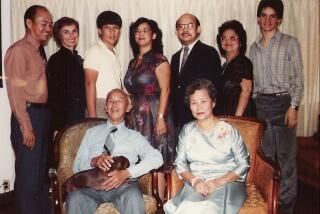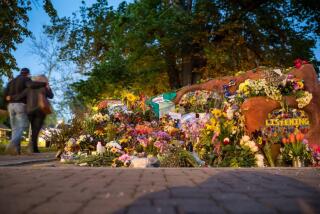An ‘Unconventional Family’ Has Hopes of Beating the Odds
- Share via
Charleton Long misses his old neighborhood, his high school buddies and the many Motown memories he left behind in Detroit when he moved to Orange County to live with his brother two years ago. But what the 17-year-old Tustin High School senior doesn’t miss about his former hometown are the crack houses, the prostitutes, the poverty and violence that make Detroit one of the top five cities for murder and crime in the country.
Long faces terrible survival odds, just for who he is.
One in every four black men in their 20s are in prison or on parole; a black man in a major U.S. urban area has a less of a chance to live beyond age 30 than a man in Ethiopia.
But in a sparsely decorated apartment on the Tustin/Santa Ana border, Long and his 21-year-old brother Christopher are trying to beat the odds.
“I realize that being here in Orange County is really the best for me,” Charleton Long said.
The Long family’s problems began in 1983, when the oldest brother, Michael, killed another man over a soured drug deal. Less than three months later, his mother died. His father, an alcoholic, never lived with the family.
Other family members took care of the boys until Christopher joined the Marines and was stationed at El Toro. In 1988, Christopher sent for Charleton and then legally adopted him so he could claim the boy as a military dependent.
The brothers are the first to admit they put an additional twist to the term “unconventional family,” particularly in Orange County.
“Overall, I like Orange County and what it has to offer for both of us,” Christopher Long said. “I knew I couldn’t let Charleton stay in Detroit. I lived in that neighborhood until I was able to get out, and I saw what it did to people, including our brother. It’s no way to live. It’s a trap. I was strong enough to make it out. I didn’t want him to be put to the same test.”
But even with those benefits and with Charleton working part time after school, the brothers say making ends meet is tough, and keeping within their budget usually means sacrificing a great deal.
“There are things I’d like to buy for myself, such as clothes and other stuff,” said the older Long. “But since I know I can’t get him (Charleton) the same things, I just do without. It’s no big deal though. You have to do what you have to do. I don’t regret it at all.”
The two share the responsibilities around the house. Charleton cooks and does most of the house chores after school while Christopher works. On weekends, Christopher oversees most of the business, including managing the monthly bills and filling out financial aid forms for both to attend college in the fall.
“We both know how important an education is to eventually becoming successful,” Christopher Long said. “Our mother really wanted all of us to attend college, so we are hoping we can fulfill at least part of that dream.” Charleton plans to attend Morehouse, a historically black college in Atlanta that educated such famous men as Martin Luther King Jr. and film director Spike Lee.
In addition to the daily struggles of two young people out on their own, holidays prove to be the most painful and lonely time for the pair as they remember their mother and brother, who usually spent Christmas and Thanksgiving with them back in Detroit.
“We really don’t talk about it out loud much, but I know we both think about them when we are purchasing the Christmas tree or the Thanksgiving turkey,” Charleton Long said. “We do get an opportunity to talk to our brother, who calls us about once a month to let us know how he is doing. We send him money every now and then for cigarettes or gym shoes, anything he might need. He doesn’t ask us for anything, but we know he needs things from time to time.”
Christopher Long said the relatively slow pace and lack of violent crime in Orange County make his parenting job easier.
“I know if we were living in L.A., we would have a much harder time making it,” he said. “The crime rate there is almost as bad as Detroit. We’re trying to get away from that kind of environment.”
More to Read
Sign up for Essential California
The most important California stories and recommendations in your inbox every morning.
You may occasionally receive promotional content from the Los Angeles Times.













